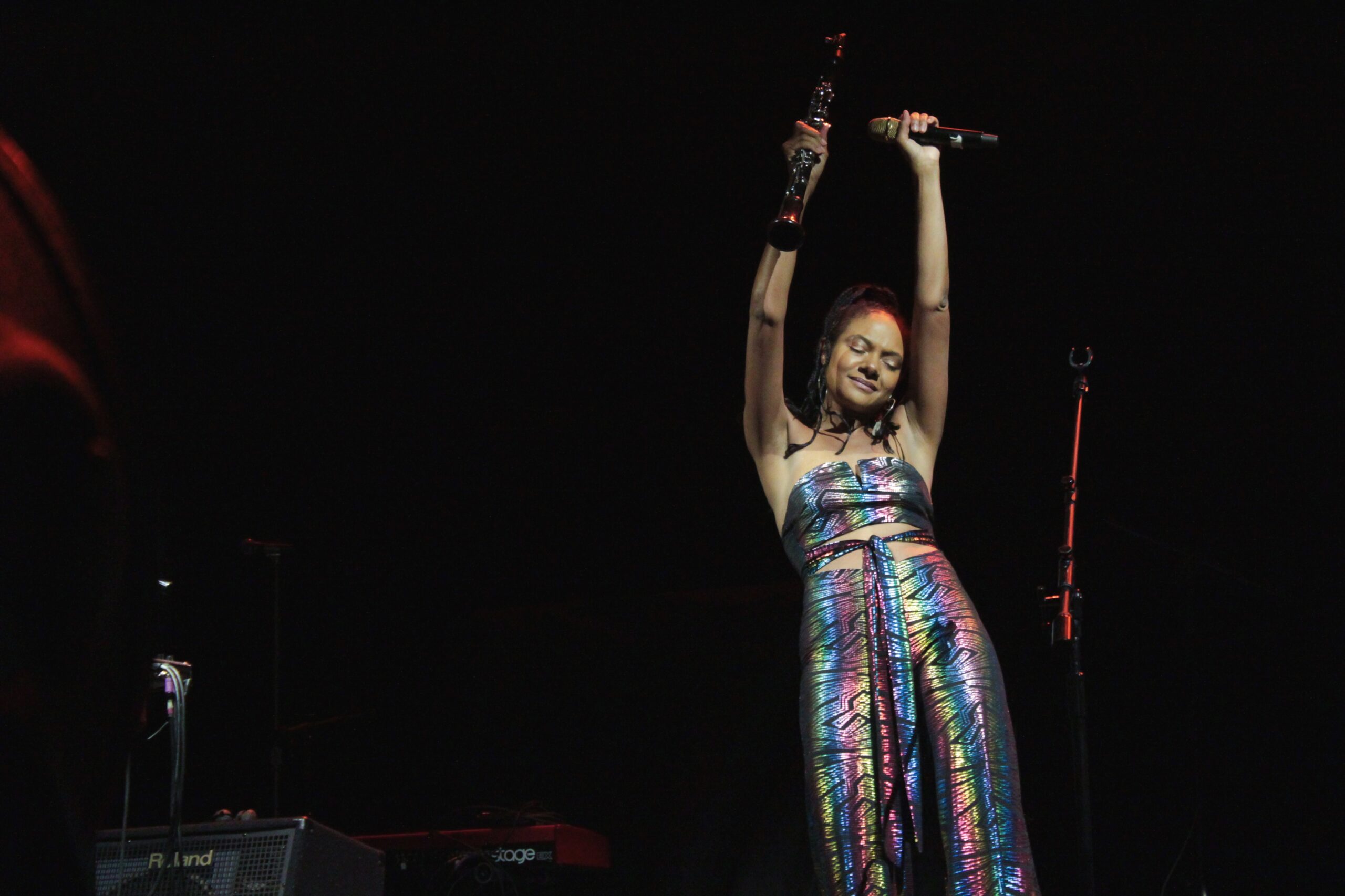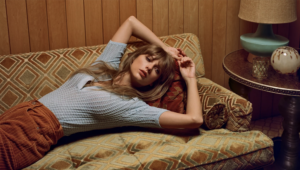The Anthem was unusually quiet on the evening of Oct. 17. In a matter of minutes, the Loveloud music festival would begin, and icons like Victoria Monet, Dan Reynolds of Imagine Dragons, and Tyler Glen of Neon Trees would take the stage.
But the venue wasn’t humming with the anticipation typical of most festivals; the crowd milled around the open space, muttering and periodically glancing at the unlit stage. They seemed unsure of what to expect—and, with a lineup of artists spanning such diverse styles, who could blame them?
The festival was chaotic, with music ranging from the folk songs of Allison Russell to Reynolds’ lo-fi interpretations of Imagine Dragons’ biggest hits. There were pop performances from David Archuleta and Victoria Monet, gospel-style songs by Tyler Glenn, and even violin EDM by Lindsey Stirling.
LoveLoud, founded in 2017 by Reynolds and Glenn, the lead vocalists of Imagine Dragons and Neon Trees respectively, has hosted LGBTQ+ charity fundraiser festivals drawing tens of thousands of people for years, but never outside of Utah. However, this year, LoveLoud is taking the show on the road. This event at The Anthem, to an admittedly smaller crowd, kicked off LoveLoud’s 2023 three-city national tour.
Glenn opened the show by sharing the tension he felt between his queer identity and his faith. Glenn told the crowd he felt out of place growing up, but for his family, the Mormon Church was “the truth and the light.” So, he hid the parts of himself that didn’t quite fit.
“I didn’t utter the words ‘I was gay’ to myself until I served a full-time Mormon mission,” Glenn said. “For a lot of my teens and twenties, it felt like a secret I would keep forever.”
Glenn’s proceeding set mirrored these themes with a drastically divergent musicality from Neon Trees’ new wave-pop hits, like “Animal” and “Everybody Talks.” In his gospel-style song “Devil,” Glenn clutched his stomach, seeming to re-experience the struggle of reconciling his faith and sexuality. The lyrics of his bonafide crisis of faith, “Tell mama I’m coming home / I found myself when I lost my faith,” capture the support Glenn felt accepting his queer identity—a support he aimed to provide to other queer youth when co-founding LoveLoud.
Glenn’s refrain rang true for another of the night’s singers: David Archuleta. The 2008 American Idol runner-up also left the Mormon church because of his sexuality. Despite similar themes, the men’s performances were dichotomous.
Where Glenn’s songs drew inspiration from the music of the faith he left behind, Archuleta transported the audience back to the glitzy pop productions of NSYNC and the 2010s. Archuleta and two bedazzled background dancers leaped the stage with large, stylized movements—spinning, jumping, popping and locking.
In “OK, alright,” complex choreography played a thrilling game of tug-of-war with tender, contemplative lyrics for the audience’s attention: “Sometimes I wake up in / the wrong side of my head / the little voices creep back in.”
Towards the end of Archuleta’s set, the high production faded and the dancers disappeared. Awash in the glow of a solo spotlight at center stage, Archuleta shared his coming-out story, recalling the challenges of being queer in a deeply religious community.
Stepping even further away from his 2010s pop roots, Archuleta played a cover of the soulful “I Am Light” by India.Arie on the keyboard. Here, he urged the crowd to remember that being queer is beautiful.
“This song has been so important to me in my journey,” Archuleta said. “It’s not always easy to accept yourself and come to terms with your sexuality, especially if you grew up in a household that doesn’t encourage you to accept yourself.”
At this, a middle-aged man in the crowd screamed, “I love you, David!” The singer beamed.
During his set, Dan Reynolds emphasized the importance of allyship and what it means to love unconditionally—especially for those in Orthodox religious communities.
Unlike his LoveLoud co-founder who performed original, solo music, Reynolds sang his band’s top hits such as “Believer,” “It’s Time,” and “Demons” with a lo-fi twist. The piano backing gave an intimacy to songs embedded in the public psyche as heavily-produced pop. For “It’s Time,” the audience loudly chanted the refrain, echoing LoveLoud’s central message: “I’m never changing who I am.”
Though the crowd loudly cheered him on, Reynolds kept his set intentionally brief.
“You’ve heard playing from enough straight white guys to last a lifetime,” Reynolds said. “But, thank you for letting me be a part of something bigger.”
The brevity of Reynolds’s set gave his peers more time to shine—and, of all the festival’s artists, Victoria Monet used every second. Fresh off her Jaguar tour, the pop sensation’s performance was the event’s brightest and tightest. Most of Monet’s set came from her debut studio album Jaguar II (2023). Surrounded by verdant vegetation and flanked by leopard bikini-clad background dancers, the singer drew on animalistic imagery to celebrate her own sexual liberation.
In “How Does It Make You Feel,” Monet sings, “I’ll always love you with no compromise / Deeper than the seas and higher than the sky” with soulful sensuality, arms raised to the singing crowd. As red and purple lights strobed, the high intensity stirred the audience into a frenzy.
In “Stop (Askin’ Me 4Shyt),” Monet refuses to give any more to a person who never reciprocates. Typically a dynamic performer, she struck the same commanding pose for most of the song, eyes blazing and finger raised in mock argument. She rants, “It ain’t even Christmas / And it ain’t your birthday / So why you callin’ me with a wishlist / Like I live in a vase?”
On tour, Monet often tweaks the song’s bridge to reflect her advocacy—informed by her experience as a queer artist of color. At past shows, she’s demanded people “stop pitting Black female artists against each other” and “stop reselling my tour tickets at five times the price.” At Loveloud, she sang, “stop being homophobic and transphobic—it’s 2023!” The audience roared.
Monet wasn’t the only artist to directly advocate for social justice. After kicking off her set with a bursting rendition of “Springtime,” the first track off her newly-released The Returner (2023), Allison Russell motioned for her band to quiet down.
“Despite the atrocities we are witnessing, all children are our children,” she said. “Everyone here in this room is either a member of—or an ally to—the LGBTQIAP+ community. And as such, we know what it means to be demonized, to be dehumanized, to have our rights infringed upon. So we cannot look with indifference on what is happening in the Gaza strip.”
While most acts focused on LGBTQ+ rights, Russell’s call to action reflects LoveLoud’s general ethos. Russell’s music is about love—both for yourself and for others. In “Demons,” she demands that the audience confront the worst parts of themselves: “Oh turn around, look ’em in the face / They don’t like how sunlight tastes.” The audience joined in a call-and-response, thundering “Demons (demons) / Demons (demons).” For Russell, empathy is rooted in self-compassion—to accept others’ darkness, we have to embrace our own.
Halfway through the show, the house lights went up. After a few seconds of confused muttering, a young man shuffled onto the stage. He didn’t look like a singer—his knuckles turned white as he eyed the massive crowd. He introduced himself as Adali Hernandez, a representative of the Trevor Project, a nonprofit organization dedicated to providing mental healthcare to queer youth.
At first, the crowd was restless to continue the show. But as Hernandez spoke, imploring the audience to support and defend queer kids, conversations thinned and attention shifted to him.
“Take a look around,” Hernandez instructed us. The venue shuffled with the sound of thousands of turning heads and amused nods. He raised his arms, beaming.
“This is what it means to love loud.”





